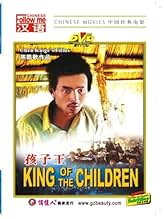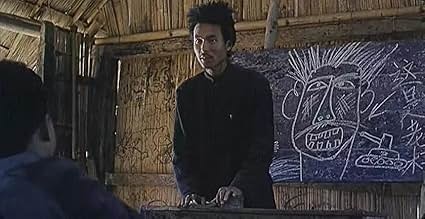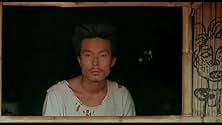This film is adapted from the novel of Ah Cheng. During the Cultural Revolution (1966-1976), a young man is assigned to teach in village school.This film is adapted from the novel of Ah Cheng. During the Cultural Revolution (1966-1976), a young man is assigned to teach in village school.This film is adapted from the novel of Ah Cheng. During the Cultural Revolution (1966-1976), a young man is assigned to teach in village school.
- Awards
- 4 wins & 3 nominations total
- Director
- Writers
- All cast & crew
- Production, box office & more at IMDbPro
Featured reviews
King of the Children (Haizi Wang) may have a General Audiences rating; however it is far from a general audiences film (especially Western audiences). The film is too austere, too realistic, and too poignant to be appreciated by the vast majority of Western viewers. They appreciate teaching films like Goodbye, Mr Chips (both the classic original with Robert Donat and the passable remake with Peter O'Toole), Conrack, To Sir With Love, Stand and Deliver, Dead Poet's Society, and even Mr. Holland's Opus. These are all fine films in their own right, and I may have left off one or two of the viewers' favorites, but this films annihilates them for sheer raw power.
Set in a very poor countryside village in the early 1970s, the settings of the other teacher films on the list are luxurious in comparison. The ghetto of Los Angeles is a luxury resort compared to these villages and the struggle of these Chinese peasants to merely survive every day with food and clothing. We do not see communism at all in any of these scenes; merely poverty and people pulling together to survive in a basic socialistic approach. There is no other way to survive these conditions. Chen Kaige is one of the two greatest directors in Chinese cinema (the other being Zhang Yimou). And it shows in this stunningly beautiful, and at the same time, ugly, film. The movie requires a great deal of patience to watch (I viewed it with no subtitles and had no problem understanding every scene; the mark of a great filmmaker). Few Americans will have the patience to endure the film, nor the intelligence to appreciate it, but some will. It is a trip worth taking.
Set in a very poor countryside village in the early 1970s, the settings of the other teacher films on the list are luxurious in comparison. The ghetto of Los Angeles is a luxury resort compared to these villages and the struggle of these Chinese peasants to merely survive every day with food and clothing. We do not see communism at all in any of these scenes; merely poverty and people pulling together to survive in a basic socialistic approach. There is no other way to survive these conditions. Chen Kaige is one of the two greatest directors in Chinese cinema (the other being Zhang Yimou). And it shows in this stunningly beautiful, and at the same time, ugly, film. The movie requires a great deal of patience to watch (I viewed it with no subtitles and had no problem understanding every scene; the mark of a great filmmaker). Few Americans will have the patience to endure the film, nor the intelligence to appreciate it, but some will. It is a trip worth taking.
This was kind of a trippy experience for me and not at all what I would've expected after let's say Yellow Earth. It's very elusive with it's ideas, possibly due to the censorship, It's suggestive enough so that I have a few suspicions about some of what is happening, it has some dream-like scenes, which the director did not employ in any of his other movies that I have seen, it's got some beautiful visuals that are quite artistic in these very minimalistic sets and bare landscapes. That dried out tree is the subject of several surreal compositions. It's a climate I cannot make sense of, the area looks both lush and barren, droughty. The school is in the open air, apart from the thatched roof practically.
I don't really understand the ending, it was again a little trippy, I don't know whether the mountain on fire was just a reflection of that poem of a manifestation of the last line of dialogue and why. Maybe censorship caused the writers to get creative and lend the story to several interpretations. I resented that a little. The dialogues are also very inconclusive, especially when it matters. I had bad subtitles clearly, but all the same. The higher ups disliked his teaching methods. It's not clearly stated whether he was in a labour/reeducation camp, but it looked like it. He had been in the area for seven years but I don't think he taught the children more than a few months. It's said he was unschooled but he was clearly well read. It's a little annoying not knowing for sure. In Chinese it seems it's important to achieve knowledge of as many words as possible. The higher the number, the better. In that regard he was obviously qualified to teach. And then there's this guy's hair, which was trippy in itself. Was this a reflection of eighties' sensibilities or some people's hair just sits like that? See, I can't shake these thoughts...
I don't really understand the ending, it was again a little trippy, I don't know whether the mountain on fire was just a reflection of that poem of a manifestation of the last line of dialogue and why. Maybe censorship caused the writers to get creative and lend the story to several interpretations. I resented that a little. The dialogues are also very inconclusive, especially when it matters. I had bad subtitles clearly, but all the same. The higher ups disliked his teaching methods. It's not clearly stated whether he was in a labour/reeducation camp, but it looked like it. He had been in the area for seven years but I don't think he taught the children more than a few months. It's said he was unschooled but he was clearly well read. It's a little annoying not knowing for sure. In Chinese it seems it's important to achieve knowledge of as many words as possible. The higher the number, the better. In that regard he was obviously qualified to teach. And then there's this guy's hair, which was trippy in itself. Was this a reflection of eighties' sensibilities or some people's hair just sits like that? See, I can't shake these thoughts...
10zzmale
In contrast to his previous works of carefully concealing the criticism of not-so-favorite part of Chinese tradition, this film took a completely different turn: although generally shaped by the social criticism, namely, targeting Cultural Revolution, there is a praise of the good part of traditional Chinese culture, such as the dedication for the next generation, the endurance, the emphasis on education.
For viewers who are already familiar with the Cultural Revolution, <<King of the Children>> is a subtle commentary on that era. Chen Kaige uses humour and philosophy to address the issues of the Cultural Revolution, and he creates a space for the adults who suffered during that period and the children who followed them.
Part of what makes this movie a masterpiece is the cinematography. Chen Kaige focuses on the vast landscapes of western China. The imagery reflects on personal and political aspects of Taoism through which the director has processed China's modern history.
For viewers who are not familiar with history, the movie will still have a profound effect. The themes are universal: how do we transmit our knowledge and/or our wisdom to the generation which follows us? How do we balance political problems with personal growth?
Another part of this movie's success is its humour. Chen Kaige portrays irony in the politicking of the state and the lives of the characters. Fans of <<The Dead Poets' Society>> will appreciate the hero's tactics teaching a class of children without books or paper, while the school administrators store stacks of books and papers in their offices.
I would recommend this movie to anyone who wants to better understand the Fifth Generation directors and the challenges of Chinese cinema shortly following the Cultural Revolution.
Part of what makes this movie a masterpiece is the cinematography. Chen Kaige focuses on the vast landscapes of western China. The imagery reflects on personal and political aspects of Taoism through which the director has processed China's modern history.
For viewers who are not familiar with history, the movie will still have a profound effect. The themes are universal: how do we transmit our knowledge and/or our wisdom to the generation which follows us? How do we balance political problems with personal growth?
Another part of this movie's success is its humour. Chen Kaige portrays irony in the politicking of the state and the lives of the characters. Fans of <<The Dead Poets' Society>> will appreciate the hero's tactics teaching a class of children without books or paper, while the school administrators store stacks of books and papers in their offices.
I would recommend this movie to anyone who wants to better understand the Fifth Generation directors and the challenges of Chinese cinema shortly following the Cultural Revolution.
Haizi Wang focuses on a group of "sent down youth": teenagers exiled to the countryside in the far SW province of Yunnan during the cultural revolution. The protagonist accepts a job as a teacher in an impoverished school and begins teaching his rural pupils in the traditional manner--the instructor transcribes the text of the lesson on the chalkboard, the students recite the lesson aloud, and copy the text in their notebooks. His most ambitious student takes on the task of transcribing the entire dictionary.
The subject of this film is the propagation of Chinese cultural values through traditional style of education. This theme reflects a view prevalent among Chen Kaige's generation who experienced the CR first hand: even though the Cultural Revolution set out to do away with the trappings of China's "feudal" cultural heritage, the language and rhetoric of the participants was infused with deep rooted, "traditional feudal values." Thus the CR only succeeded in replicating the same values it sought to eradicate.
The cinematography and narrative structure of the Haizi Wang underscore the director's concern with breaking from blind imitation of conventional filmmaking.
**Contrast with other films about sent down youth: Sacrificed Youth and Xie Jin's The Herdsman.
The subject of this film is the propagation of Chinese cultural values through traditional style of education. This theme reflects a view prevalent among Chen Kaige's generation who experienced the CR first hand: even though the Cultural Revolution set out to do away with the trappings of China's "feudal" cultural heritage, the language and rhetoric of the participants was infused with deep rooted, "traditional feudal values." Thus the CR only succeeded in replicating the same values it sought to eradicate.
The cinematography and narrative structure of the Haizi Wang underscore the director's concern with breaking from blind imitation of conventional filmmaking.
**Contrast with other films about sent down youth: Sacrificed Youth and Xie Jin's The Herdsman.
Details
- Release date
- Country of origin
- Language
- Also known as
- King of the Children
- Production companies
- See more company credits at IMDbPro
- Runtime
- 1h 46m(106 min)
- Sound mix
- Aspect ratio
- 1.85 : 1
Contribute to this page
Suggest an edit or add missing content



















